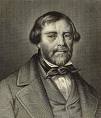Joseph Marie Eugene Sue 1804 – 1857
June 20, 2009
 Joseph Marie
Eugene Sue 1804 – 1857
was a French novelist.
Joseph Marie
Eugene Sue 1804 – 1857
was a French novelist.
Eugene Sue was an advocate of homeopathy, and 1842-3, in his Mysteries of Paris, he soundly criticises the detractors of homeopathy.
Eugene Sue was a friend of Marguerite Power Farmer Gardiner, Countess of Blessington, (whose soirees attracted many homeopaths and homeopathic supporters, including Hans Christian Andersen, Abbe Campbell, the Chalons, Keppel Richard Craven, Charles Dickens, Benjamin Disraeli, William Drummond, William Gell, Mary Augusta Fox Holland, Theodore Edward Hook, Walter Savage Landor, Samuel Lover, Richard Robert Madden, Charles James Mathews, Frederick Hervey Foster Quin, Richard Westmacott, and many others).
Eugene Sue was born in Paris, the son of a distinguished surgeon inNapoleon Bonaparte’s army, and is said to have had the Empress Josephine for godmother.
Sue himself acted as surgeon both in the Spanish campaign undertaken by France in 1823 and at the Battle of Navarino (1828). In 1829 his father’s death put him in possession of a considerable fortune, and he settled in Paris.
A street in Paris is named for Eugene Sue, in the 18th Arrondissement: Rue Eugene Sue is located near the Poissonnière Metro station, and is not far from Montmartre and the Basilica of the Sacré Coeur.
His naval experiences supplied much of the materials of his first novels, Kernock le pirate (1830), Atar-Gull (1831), La Salamandre (2 vols., 1832), La Coucaratcha (4 vols., 1832-1834), and others, which were composed at the height of the Romantic movement of 1830. In the quasi historical style he wrote Jean Cavalier, ou Les Fanatiques des Cevennes (4 vols., 1840) and Lautréaumont (2 vols., 1837).
He was strongly affected by the Socialist ideas of the day, and these prompted his most famous works: Les Mystères de Paris (10 vols., 1842-1843) and Le Juif errant (The Wandering Jew) (10 vols., 1844-1845), which were among the most popular specimens of the roman feuilleton.
He followed these up with some singular and not very edifying books: Les Sept pêchés capitaux (16 vols., 1847-1849), which contained stories to illustrate each of the Seven Deadly Sins, Les Mystères du peuple (1849-1856), which was suppressed by the censor in 1857, and several others, all on a very large scale, though the number of volumes gives an exaggerated idea of their length. Some of his books, among them Le Juif Errant and the Mystères de Paris, were dramatized by himself, usually in collaboration with others.
His period of greatest success and popularity coincided with that of Alexandre Dumas pere, with whom he has been compared. Sue has neither Alexandre Dumas pere’s wide range of subject, nor, above all, his faculty of conducting the story by means of lively dialogue; he has, however, a command of terror which Alexandre Dumas pere seldom or never attained.
After the revolution of 1848 he sat for Paris (the Seine) in the Assembly from April 1850, and was exiled in consequence of his protest against the coup d’état of 2 December 1851. This exile stimulated his literary production, but the works of his last days are on the whole much inferior to those of his middle period. Sue died at Annecy (Savoy) in 1857.
Of interest:
Paul Sue - 1837, a relative of Eugene Sue, was born in New Jersey in 1837. He lived for 14 years in France, returning to America in 1853, he graduated as a homeopath at the Homeopathy Depatment at the University of Michigan in 1889.